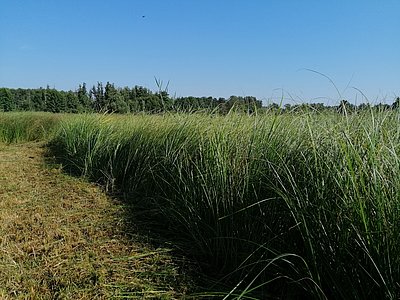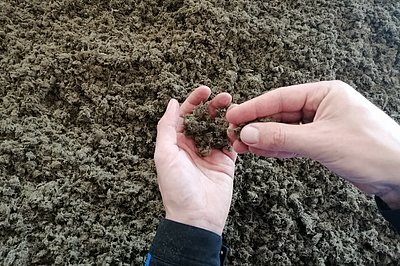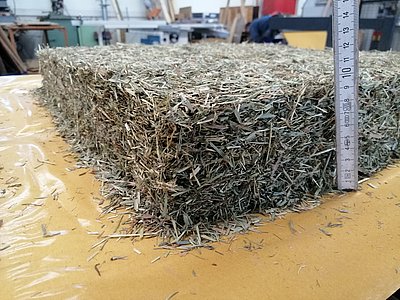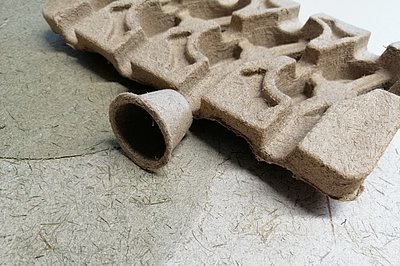Paludiculture
Technology and innovation for rewetted fen sites
Paludiculture is wet agriculture and also forestry on peatlands.
Healthy peatlands act as enormous carbon stores. With 450 gigatons, they store more carbon than all the forests on earth. Yet in many sites, peatlands have been drained in order to use the land for agriculture or to exploit peat. With drainage, the peat formed over thousands of years is exposed to aeration and microbial degradation, resulting in the release of enormous amounts of the greenhouse gas carbon dioxide. 37 percent of CO2 emissions from agriculture derive from former peat lands, even though peat lands account for only seven percent of agricultural land. Also in the State of Brandenburg, a large part of the peatland is drained and responsible for high greenhouse gas emissions, with more than 30 tons of CO2 equivalents per hectare per year.
Rewetting!
To safeguard the future of peatlands as carbon and water reservoirs, the FAO MICCA (FAO 2012), for example, recommends that drained areas should be rewetted and managed by paludiculture, i.e. that the wet or rewetted peatland soils should be used for agriculture. Accordingly, the rewetting is part of the 'Natural climate protection action program' launched by the German federal government in 2023.
However, rewetting has as result that the areas are then dominated by different plant species such as reeds, sedges, reed canary grass, woody plants such as black alder, or herbs such as fever clover and valerian.
Wanted: Attractive and feasible management practices for paludiculture
Currently, there is still a lack of practicable and profitable models for a changeover to peatland-conserving or peatland-preserving management.
ATB is working intensively on solutions for peatland protection and has, among other things, worked on ways to produce biochar as a substitute for peat.
At present, research in several projects (see below) is focusing in particular on developing, jointly with users, strategies and solutions for management methods adapted to high water levels and on establishing commercially viable, attractive utilization options for peatland biomass in regional value chains.
In the sense of a cascading biomass utilization, the main focus is on a material utilization that promises a higher added value with a better climate balance compared to an energetic utilization.
ATB can draw from decades of experience in the field of technology and process development for plant fiber production, for example from hemp or nettle, and uses its expertise and infrastructure to adapt established processes on the one hand and to develop new solutions for the special raw material-specific requirements of paludiculture plants on the other.
Sustainable biomaterials from bog biomass
Fen crops can be processed into a wide variety of sustainable products, such as organic building materials, peat substitutes for gardening substrates, litter pellets, papers, packagings, or even disposable dishes. The raw material is provided by the biomass of sedges, calcareous rushes, reeds, Typha (bulrush), reed canary grass and a number of other crops.
Preliminary research carried out by the working groups "Process Engineering for Fiber Crops" and "Process Enginering for Energy Crops" at ATB and the resulting product samples are very promising.
Selected research projects on the topic
-
In Brandenburg, there are extensive lowland moor areas with a great diversity of habitats, which are, however, almost completely drained and subject to progressive degradation. There is preliminary work on rewetting in s…
-
Conventional agricultural use of peatlands requires their drainage and causes enormous GHG emissions, progressive peatland loss (slumping, decomposition, erosion), biodiversity losses, nutrient discharges and management …
-
The rewetting of organic soils is one of the most important greenhouse gas mitigation options in agriculture with the highest mitigation potential. The state of Brandenburg has 165,000 ha of peatland. In 2019, the Brand…
-
In the PaludiKult project, the sustainable production and processing of paludibio mass for use as fibre in growing media is being researched and tested in practice. For this purpose, the site- and species-specific biomas…
-
At present, 60-70% of all soils are unhealthy in Europe as a result of land management practices, pollution, intensive agriculture, urbanisation, and the effects of climate change. Due to this and other biophysical const…
-
In the PalFaForm project, a novel process chain for the production of moulded fibre parts from biomass of rewetted lowland moorland in agriculture will be developed. The aim is to further develop the process of thermo-me…
-
The main aim of the GO-GRASS project is to create new business opportunities in rural areas based on grassland and green fodder that will be demonstrated in four EU regions at small scale, ensuring its replicability all …
Search for more projects ...
Selected publications on the topic
- Heinrich, T.; Park, H.; Orozco, R.; Ding, Z.; Álvarez-López, V.; Mosquera-Losada, M.; Steinbeis, L.; Hoffmann, T. (2023): Biochar production from late-harvest grass - Challenges and potential for farm-scale implementation. Sustainable Production and Consumption. (May): p. 256-267. Online: https://doi.org/10.1016/j.spc.2023.02.019
- Farru, G.; Dang, H.; Schultze, M.; Kern, J.; Cappai, G.; Libra, J. (2022): Benefits and Limitations of Using Hydrochars from Organic Residues as Replacement for Peat on Growing Media. Horticulturae. (4): p. 325. Online: https://doi.org/10.3390/horticulturae8040325
- Dittrich, C.; Pecenka, R.; Løes, A.; Cáceres, R.; Conroy, J.; Rayns, F.; Schmutz, U.; Kir, A.; Kruggel-Emden, H. (2021): Extrusion of Different Plants into Fibre for Peat Replacement in Growing Media: Adjustment of Parameters to Achieve Satisfactory Physical Fibre-Properties. Agronomy. (6): p. 1185. Online: https://doi.org/10.3390/agronomy11061185
- Kern, J.; Tammeorg, P.; Shanskiy, M.; Sakrabani, R.; Knicker, H.; Kammann, C.; Tuhkanen, E.; Smidt, G.; Prasad, M.; Tiilikkala, K.; Sohi, S.; Gasco, G.; Steiner, C.; Glaser, B. (2017): Synergistic use of peat and char materials in growing media - one option reducing the pressure on peatlands?. Journal of Environmental Engineering and Landscape Management. (2): p. 160-174. Online: http://dx.doi.org/10.3846/16486897.2017.1284665
- Swails, E.; Jaye, D.; Verchot, L.; Hergoualc'h, K.; Schirrmann, M.; Borchard, N.; Wahyuni, N.; Lawrence, D. (2017): Will CO2 emissions from drained tropical peatlands decline over time? Links between soil organic matter quality, nutrients, and C mineralization rates. Ecosystems. (152): p. 1-18. Online: https://doi.org/10.1007/s10021-017-0190-4
Search for more publications on the topic ...






